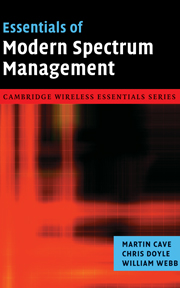Book contents
- Frontmatter
- Contents
- Acknowledgements
- I Emerging problems with the current spectrum management approach
- II Markets
- 4 Market solutions
- 5 Auctions
- 6 Spectrum trading: secondary markets
- 7 Technical issues with property rights
- 8 Economic issues with property rights
- 9 Competition issues relating to spectrum
- 10 Band management
- III Regulation
- IV Conclusions
- Further reading
- Abbreviations
- Author biographies
- Subject index
- References
6 - Spectrum trading: secondary markets
Published online by Cambridge University Press: 13 August 2009
- Frontmatter
- Contents
- Acknowledgements
- I Emerging problems with the current spectrum management approach
- II Markets
- 4 Market solutions
- 5 Auctions
- 6 Spectrum trading: secondary markets
- 7 Technical issues with property rights
- 8 Economic issues with property rights
- 9 Competition issues relating to spectrum
- 10 Band management
- III Regulation
- IV Conclusions
- Further reading
- Abbreviations
- Author biographies
- Subject index
- References
Summary
Introduction
Following the initial assignment of spectrum rights and obligations to users, whether by auction or other means, circumstances may change causing initial licence holders to want to trade their rights and obligations with others. Today this is not possible in many countries. However, in a few countries secondary trading – the trading of spectrum rights after the primary assignment – is possible. The possibility to trade radio spectrum is argued by many commentators to be a critical factor in the promotion of more efficient radio spectrum use. Furthermore, it is increasingly recognised that the flexibility afforded by trading is helpful for innovation and competitiveness.
Spectrum trading is a powerful way of allowing market forces to manage the assignment of radio spectrum rights and associated obligations and it is a significant step towards a market-based spectrum management regime. The trading of radio spectrum rights has been discussed as a policy option for many years and dates back to the seminal contribution of Coase [1]. It is widely accepted by economists and increasingly by spectrum policy makers that appropriately supervised market forces can be superior to the widely used but more inflexible command-and-control methods.
Trading of spectrum is made much more powerful when it is combined with policies aimed at promoting liberalisation in use; that is allowing users to choose the use to which a frequency band is put – subject perhaps to some constraints regarding the interference that can be caused (see Chapter 7).
- Type
- Chapter
- Information
- Essentials of Modern Spectrum Management , pp. 85 - 104Publisher: Cambridge University PressPrint publication year: 2007

